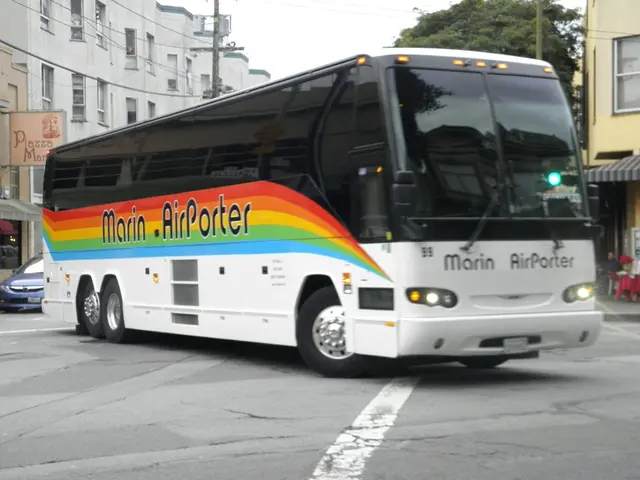Taxi Integration into Public Transit Systems - Proposal for Novel Models by Association - Taxi Industry Ponders Shift to Mainstream Commuter Services - Association Contemplates Innovative Travel Models
Thuringia Contemplates Enhanced Public Transportation with Taxis
The Thuringia Transport Business Association is proposing the expansion of taxis into subsidized public transportation services. This could lead to the implementation of on-demand, shared, or route taxis, particularly in rural areas and urban outskirts.
Martin Kammer, head of the Thuringia Transport Business Association, spoke to the German Press Agency (dpa) in Erfurt, revealing around 800 taxis and approximately 1,200 rental cars currently operating on Thuringia's roads.
While the Association of Central German Bus Companies has expressed reservations due to high public expenses for relatively few passengers, Kammer emphasizes a stable economic climate within the taxi industry. This is largely due to contracted trips, such as those for patient transport or students with disabilities.
So far, just a few taxi models have been utilized in Thuringia's public transportation. Cities like Jena and Greiz district serve as examples. According to Kammer, the association advocates for a review of Thuringia's regular service network, considering both costs and service aspects, including which areas should see buses deployed and where taxis are more suitable.
In regions where buses are underutilized, taxis could operate, providing transportation to bus stations or other hubs, or serving areas with limited departures.
The Thuringia Transport Business Association, representing around 600 transport companies, logistics providers, and taxi and rental car companies, recently presented a list of demands to both federal and state governments. This includes increased consideration for taxis and rental cars in future public transportation planning, aiming to improve mobility in urban fringe areas and rural regions. Over 20,000 employees are employed in Thuringia's transport business.
Tilman Wagenknecht, head of the Association of Central German Bus Companies, acknowledges the potential for taxis to be part of new public transportation plans in certain regions. However, he stresses the importance of considering transportation costs per passenger, as public transportation funding is limited.
In some areas, on-call buses and call-a-ride taxis are already being utilized for on-demand transportation services. Approximately 100 bus companies operate in Thuringia's regular service.
Integrating taxis into public transportation systems can offer increased accessibility, complementary services, and economic benefits, while also contributing to environmental efficiency. However, potential challenges include regulatory frameworks, public acceptance, technological integration, and financial viability. In Thuringia, rural and urban areas might necessitate different service tailoring to maximize efficiency and accessibility. Support services for vulnerable populations could also be required to ensure all residents can benefit from the integrated system.
Through careful planning, public engagement, and a comprehensive regulatory framework, integrating taxis into public transportation in Thuringia, Germany, can overcome challenges and maximize benefits.
- The Thuringia Transport Business Association, in their list of demands, is advocating for a community policy that increase the consideration for taxis and rental cars in future public transportation planning, aiming to provide vocational training opportunities for the taxi industry in the finance sector.
- With the potential expansion of taxis into subsidized public transportation services, it may be necessary to explore vocational training programs in the transportation industry, ensuring the financial sustainability of this new service.








